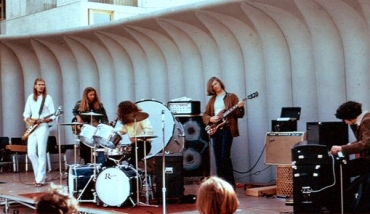I came across this picture of the marquee at the Whisky a Go Go in Hollywood and it reminded me of how people’s paths can cross over the years.
The story begins when I was still in college in San Diego, working part time as a live sound engineer at a concert club called Earth. The club was known for booking bands that were on their way up the charts.
The owner was helping a band that was being put together with some very talented and experienced musicians from Motown. They were pretty much guaranteed a record deal, but needed to bring the members together. They were going to rehearse at the club during off hours until they were ready to begin recording and touring.
One night, before their drummer arrived, they set up on stage and needed a drummer to fill in. The owner knew that I was a pretty good drummer and always carried my drum kit in my van. So I was invited to jam with the band that was to become Maxayn. It was a great experience for a college kid to play with such amazing musicians.
By the time I graduated from college, I was also playing keyboards and had designed and co-built my first synthesizer. After attempting to go it alone as a solo act, I joined the band Madame Beast as their keyboard player. We were based in Hollywood and toured the U.S. extensively, building a following that would appeal to record labels.
A couple of years in, we came back to Hollywood to do a showcase at the Whisky (as it was called then) for the record labels. Low and behold, we were sharing the billing with Maxayn. While we were both extremely busy focusing on our shows, I did drop by their dressing room for a minute. It was good to see them and I wished them a great set.
Several years passed and I had been in several different bands since then. My current band was Lois Lane. We were also touring to make a name for ourselves so that the record labels would sign us. By that time, the leader of the Maxayn group, Andre Lewis, was pioneering a new genre called techno-funk. He was playing as Mandré.
Unexpectedly, at an outdoor show somewhere in the prairie states, we shared the bill with Mandré. This meeting wasn’t quite what you might expect. And it was one of the few live shows that Andre ever performed as Mandré. Andre was dressed as a helmeted space man. (Note: Daft Punk wasn’t the first to be anonymous space men.) It was difficult to talk to him because of his helmet. But again, it was good to know that we were both still playing shows and exploring new music.
I eventually stopped playing in bands and returned to being a solo act. This time I was using the latest synthesizer technology. Because of the knowledge I acquired doing that, I then became a Product Specialist for synthesizer manufacturers Kurzweil Music Systems and then E-mu Systems. It’s uncanny that Andre became highly influential in synth and drum machine design for Roland around the same time.
While Andre and I were never best of friends, we shared a lot of the same passion for music and technology. It was always great to hear about Andre’s accomplishments and to remember that night that we shared a jam session at a place called Earth.
May you never forget the people you meet on your journey. You never know when you will cross paths with them again.





